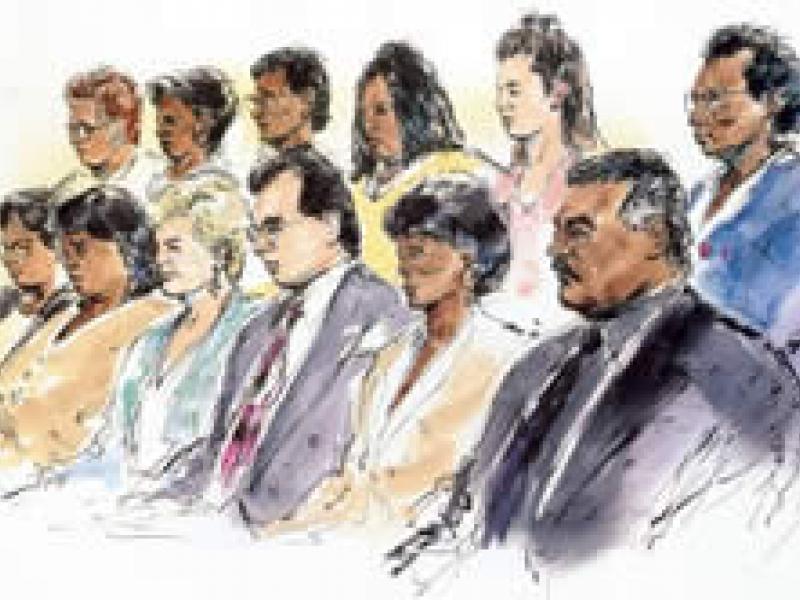Last year’s jury decisions in racially-charged investigations were only the most recent to reveal the schism in the country’s perceptions of how race intersects with justice. From the Roper Center for Public Opinion Research archives, a look back over more than twenty years of data on race and the jury system:
Shared concerns
While high-profile, racially-controversial cases tend to reveal differences in black and white attitudes, overall both groups share many of the same concerns about the process of justice. For the last twenty years, the proportion of all Americans saying they have a great deal or quite a lot of confidence in the criminal justice system overall has only once reached a third. In 2013, the proportion of blacks and white giving positive ratings were the same (26% and 27%).
Blacks and whites also both tend to perceive the courts as overly lenient. A majority think courts in their area are not harsh enough in their dealings with criminals, though the proportion saying so has been dropping since the early 1990s. Currently, twice as many blacks (24%) as whites (12%) think courts are too harsh.
The 1990s – King and Simpson
Though blacks and white may share overall views of the system, particular cases can reveal significant disagreement. Two high-profile cases in the 1990s ended with controversial acquittals: for four white LA policemen who had been videotaped beating Rodney King and for O.J. Simpson, the black football player/actor accused of murdering his ex-wife Nicole Simpson and her friend Ron Goldman.
Strong majorities of both whites and blacks saw the jury’s verdict in the Rodney King trial as wrong, though blacks were even more likely to say so. Most believed that the verdict would have been different if the jury had included black people, with blacks much more likely to think so. But lower proportions of both blacks and whites thought that the verdict would have been different had King been a white man.
A Gallup/CNN/USA Today poll taken one year after the King verdict found little racial difference in willingness to believe a police officer’s testimony. While more than four in ten blacks and whites said they would be more willing to believe such testimony than that of other witnesses, about a third of both groups said they would not.
When O.J. Simpson was found not guilty by a jury that included eight black jurors, the racial difference in attitudes toward the verdict were much more pronounced. A majority of whites disagreed with the verdict; only 8% of blacks did. However, the perception of the effect of the racial makeup of the jury did not differ by race – about half of both blacks and whites believed that the verdict would have been different if the jury had been primarily white.
After the Simpson trial fewer than half of whites held the view that either black or white jurors were more likely to convict those of a different race. A majority of blacks, however, believed whites were more likely to convict a black defendant.
One of the major concerns in the OJ Simpson case was the possibility that police planted evidence. In a CBS News poll at the time, about twice as many whites (65%) as blacks (32%) said it was a bad idea to punish police for lying or tampering with evidence by acquitting the defendant in such cases.
Recent controversies – Martin, Brown and Garner
Recent cases have shown racial divisions more akin to those in the Simpson decision than in the King verdict. In an ABC News/Washington Post poll, 51% of whites approved of the jury’s not-guilty verdict in the case of George Zimmerman, accused of murder in the shooting of unarmed black high school student Trayvon Martin. Just 31% disapproved. As in the case of the Rodney King verdict, a substantial share of the white population said they did not know (18%). There was no such doubt among black Americans: 87% disapproved, 84% strongly.
The decision of grand juries not to charge white police officers in either the shooting death of Michael Brown in Ferguson, MO in August or the choking death of Eric Garner in NYC in December also revealed starkly different racial views. Fewer than one in ten blacks approved of either jury’s decision. A majority of whites approved of the Ferguson decision, while a substantial minority approved of the decision in the Staten Island case.
Fifty-eight percent of blacks in a December Monmouth poll said they thought the decision in the Garner case would have been different if the Garner had been white, similar to the 51% who said back in 1993 that if Rodney King had been white, the jury would have found the policemen guilty. Whites, however, saw the two cases somewhat differently, despite similarities including videotape evidence. Just 22% of white Americans believed that the New York grand jury would have given a different decision if Garner had been white, compared to the 39% who thought so in the King case.
Roper Center data. Collections cited include Gallup, 1992-2014; GSS, 1972-2011; CBS News 1992, 1995; Time/Yankelovich/CNN 1992; Gallup/CNN/USA Today 1994, 1995; ABC News 1995; ABC/ News/Washington Post 2013, 2014; Monmouth University 2014.
